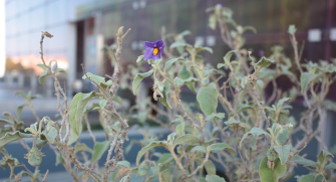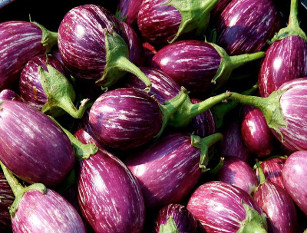
Contrarily to other vegetable crops, like tomato, the use of wild relatives in eggplant breeding has been limited. Several works show that interspecific hybrids, with different degrees of fertility, can be obtained with an important number of wild species related to eggplant (primary, secondary, and tertiary genepools). In other cases, although fruit develops after interspecific hybridization, hybrid seed does not germinate due to embryo abortion at late stages of development, or does not develop due to embryo abortion at early stages. Environmental conditions are important in the success of the interspecific hybridization, and use of different environments leads to a higher number of successful crosses. In addition, embryo rescue and micropropagation is a useful tool to obtain interspecific hybrids in eggplant crosses, showing that it can be a powerful tool in interspecific hybridization and introgression in eggplant.
Development of advanced backcross generations which present genomic fragments of interest from the wild species in a fundamentally cultivated genetic background is a pre-breeding strategy that is particularly suited to increase the diversity of the cultivated eggplant with genes from the wild species. Also, development of introgression lines (ILs) is a powerful pre-breeding tool as it allows eggplant breeders to have available the entire genome of a wild relative scattered in a set of lines having the genetic background of the cultivated eggplant. The ILs allow a rapid use in breeding programmes of genes from the wild species for present and future objectives, which is of interest in particular from pressing breeding needs resulting from unexpected climate change.
Background
Eggplant (Solanum melongena L.) is an important vegetable crop, especially in tropical and subtropical areas of the world. According to FAO statistics, eggplant ranks 6th, after tomatoes, watermelons, onions, cabbages, and cucumbers, for total global production, with 46.7 million tons produced in 2011. Eggplant is one of the 35 crops judged to be most important for food security and as such is included in the Annex 1 of the International Treaty on Plant Genetic Resources for Food and Agriculture.
Utilization of eggplant wild relatives in eggplant breeding is hindered by the fact that these eggplant wild materials present many unfavourable traits (e.g., small fruit size, bitterness presence of alkaloids, prickliness, etc.), which many times are dominant and require several generations of backcrossing in order to be removed. Modern marker assisted selection precision breeding, combined with phenotyping, allows the efficient selection of materials with introgressed desirable genes from the wild species without unfavourable traits. However, given the required investment and time required for obtaining elite materials, breeding companies have not made much use of eggplant wild relatives in applied breeding programmes. Therefore, pre-breeding work is needed in order to develop material that can be perceived as directly usable by eggplant breeders in their programmes. This is particularly needed for developing countries, where local breeding companies do not have the resources to undertake such pre-breeding programmes.
Eggplant local materials from Southeast Asia and West Africa are genetically differentiated, as the Southeast Asian varieties belong to the Oriental type, while the West African varieties to the Occidental type. This indicates that for an effective use with global impact of wild relatives in eggplant breeding introgression materials have to be obtained in both Oriental and Occidental genetic backgrounds.
Eggplant wild relatives grow in a wide range of conditions, including extreme conditions, like desertic areas, environments with wide ranges of temperatures including night temperatures below 0 ºC, waterlogged and swampy areas, etc. Because of their tolerance to abiotic and biotic stresses, eggplant wild relatives have been used for eggplant grafting. Given that eggplant wild relatives can be found in a much wider range of environmental conditions than those of cultivated eggplant, these wild relatives could play a major role in breeding eggplants for adaptation to climatic change, which is a problem of great concern in many developing countries. In this respect, the projections of the International Panel on Climate Change show that important changes in the climate will take place in Southeast Asia and in West Africa. In both developing regions eggplant is an important crop. However, breeding efforts devoted to improving the local eggplant varieties from these regions have been very limited.
Eggplant wild relatives grow in a wide range of conditions, including extreme conditions, like desertic areas, environments with wide ranges of temperatures including night temperatures below 0 ºC, waterlogged and swampy areas, etc. Because of their tolerance to abiotic and biotic stresses, eggplant wild relatives have been used for eggplant grafting. Given that eggplant wild relatives can be found in a much wider range of environmental conditions than those of cultivated eggplant, these wild relatives could play a major role in breeding eggplants for adaptation to climatic change, which is a problem of great concern in many developing countries. In this respect, the projections of the International Panel on Climate Change show that important changes in the climate will take place in Southeast Asia and in West Africa. In both developing regions eggplant is an important crop. However, breeding efforts devoted to improving the local eggplant varieties from these regions have been very limited.


This work is part of the initiative "Adapting Agriculture to Climate Change: Collecting, Protecting and Preparing Crop Wild Relatives" which is supported by the Government of Norway. The project is managed by the Global Crop Diversity Trust with the Millenium Seed Bank of the Royal Botanic Gardens, Kew and implemented in partnership with national and international gene banks and plant breeding institutes around the world. For forward informatin see the project website: http://www.cwrdiversity.org/


